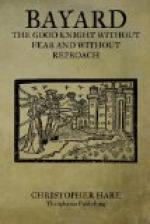The Spanish captain sent back an insolent answer, saying that he would not withdraw anything he had said, and that he would prove his words in mortal combat within twelve days, two miles from the walls of Andria. In fixing this date he knew that Bayard was ill at the time with a quartan fever. But the Good Knight would not let such a small matter interfere with his knightly honours, and when the day arrived he rode to the spot appointed, with the Sire de la Palisse and his friend Bellabre as his seconds, and about two hundred men-at-arms as a guard of honour.
Bayard was clothed in white as a mark of humility and rode a splendid horse, but as Don Alonzo had not appeared, a trumpeter was sent to hasten his coming. When he was told that the Good Knight was on horseback with the usual armour, he exclaimed: “How is this? I was to choose the arms. Trumpeter, go and tell him that I will fight on foot.” He said this, thinking that the illness of Bayard would make it quite impossible for him; and the trumpeter was greatly surprised, as all had been arranged for a duel on horseback, and this looked like a way of retreat for the Spaniard. Ill as he was Bayard showed no hesitation, and with the courage of a lion declared that he was willing to avenge his honour in any guise. The arms chosen were a sharp-pointed sword or rapier and a poignard, while the armour used included a throat-piece (gorgerin) and a secrete.[1]
[Footnote 1: Secrete, a kind of steel skull-cap, often worn under the helmet.]
When the camp was duly prepared and the champions in face of each other, Bayard knelt down and made his prayer to God, then he bent to kiss the earth, and rising, made the sign of the cross before he advanced to meet his enemy. Don Alonzo addressed him in these words: “Lord of Bayard, what do you seek from me?” And he replied: “I wish to defend my honour.” Then began the mortal combat between these two valiant men-at-arms, and never was seen more splendid skill and courage. The rapier of the Good Knight slightly wounded the face of Don Alonzo, who carefully guarded this most vulnerable part, but his foe waited until he raised his arm for the next attack, and then aimed at his neck, and notwithstanding the tempered steel of his armour, Bayard’s onslaught was so tremendous that the throat-piece (gorgerin) was pierced and the rapier, having no sharp edges (it was only used for thrusting) was driven in so far that it could not be withdrawn. Don Alonzo, feeling himself wounded unto death, dropped his sword and seized the Good Knight in his arms, the two wrestling fiercely until they both fell on the ground.
The terrible struggle lasted for some time, until Bayard struck his foe on the visor with his poignard and cried: “Don Alonzo, recognise your fault and cry for mercy to God....” But the Spanish knight made no reply, for he was already dead.
Then his second, Don Diego, said: “Seigneur Bayard, he is dead, you have conquered;” which was proved, for they took off his visor and he breathed no more. This was a sad trouble to the victor, for he would have given all he had in the world to have vanquished him alive. Then the Good Knight knelt down and thanked God humbly for his success. Afterwards he turned to the dead knight’s second and asked: “My lord Don Diego, have I done enough?”




